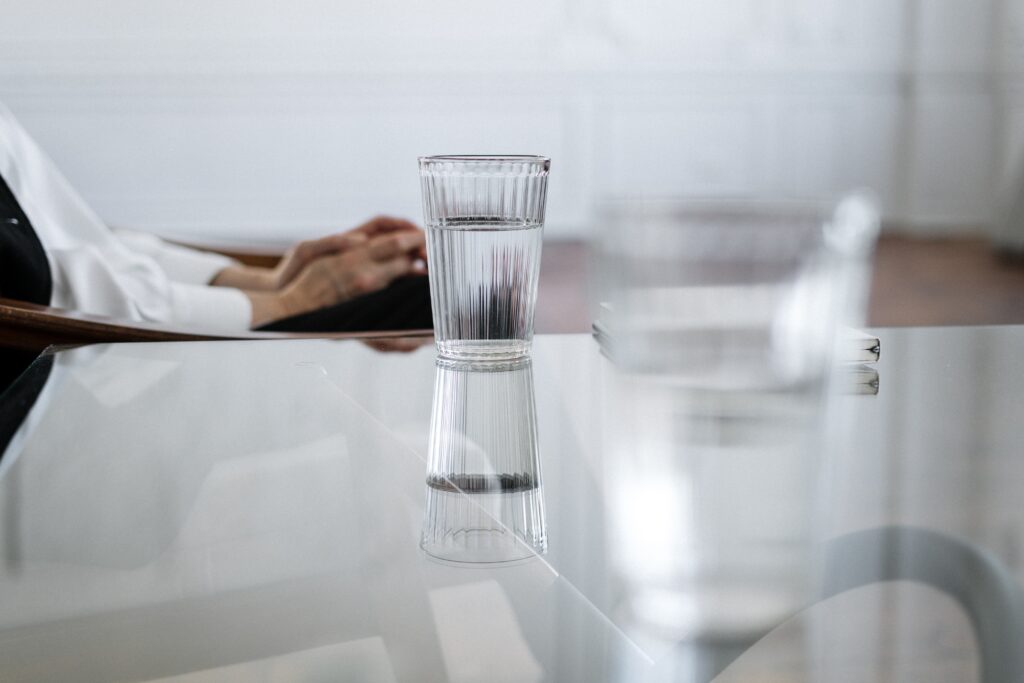
In this article, we will discuss the appropriate daily water intake, the distribution of water throughout the day, and the most hydrating beverages. Additionally, we will provide information on hydration for weight loss and athletes.
How much water should you drink per day?
On average, the recommended daily water intake is as follows:
- Men: Between 1.75 and 2 liters of water per day.
- Women: Between 1.4 and 1.6 liters of water per day.
These recommendations are applicable under moderate ambient temperature conditions and for moderate levels of physical activity. However, it is important to note that individual needs may vary based on several factors such as the body’s water regulation system, which involves the central nervous system and various organ systems, as well as inter-individual differences.
The European Food Safety Authority (EFSA) has provided age and sex-based recommendations for daily water consumption, including drinking water, beverages, and water from food:
- Infants (0 to 6 months): 680 ml (via milk).
- Infants (6 to 12 months): 800 to 1000 ml.
- Children (1 to 3 years): 1100 to 1200 ml.
- Children (4 to 8 years): 1600 ml.
- Children (9 to 13 years): 1900 ml for girls, 2100 ml for boys.
- Adolescents (14 to 18 years): 2000 ml for girls, 2500 ml for boys.
- Adults: 2000 ml for women, 2500 ml for men.
- Pregnant women: 2300 ml.
It is important to consider that these recommendations include the total daily water consumption, which includes drinking water, beverages, and water from food. The ratio of drinking water and beverages to water from food can vary and is influenced by the types of beverages and foods consumed. Diets rich in fruits and vegetables provide a greater contribution to total water intake compared to diets rich in processed or fast food products, which typically have lower water content.
Is it necessary to drink 8 glasses of water a day?
The commonly known recommendation to drink at least 8 glasses of water a day is not universally applicable. Although often used as a guideline for hydration, it is not based on reliable scientific data. Consuming 8 glasses of water a day, which is approximately 1.9 liters, may be suitable for moderately active men under normal temperature conditions, but it may be excessive for women.
How to calculate your daily water requirements?
To determine your specific daily water requirements, it is essential to consider your level of physical activity, body weight, and climatic conditions (temperature, humidity). A practical method is to personalize your water intake based on the calories you burn per day. A minimum of 1 ml of water per kcal per day is generally considered ideal for maintaining proper hydration.
For example, if we consider an athletic man who trains for 1 to 1.5 hours per day and has a daily energy requirement of 3,500 calories, his total daily water requirements (including liquids and food) would be approximately 3,500 ml, which is around 2.6 liters of water.
How to maintain adequate water intake throughout the day?
Many individuals find it challenging to consume enough water each day to meet the recommended intake (1.5 liters for women, 1.9 liters for men). Relying solely on thirst is not effective for those who struggle to drink enough water. Establishing small goals throughout the day can help increase water intake. Here are some tips:
- Start the day with a large glass of water on an empty stomach (250 ml).
- Drink water throughout the morning until lunch.
- Keep a water bottle with you at all times and sip from it regularly.
- Set reminders or alarms on your phone to remind you to drink water at specific intervals.
- Drink a glass of water before each meal to help you stay hydrated and promote healthy digestion.
- Flavor your water with fruits, herbs, or a splash of citrus to make it more enjoyable.
- Eat water-rich foods such as cucumbers, watermelon, oranges, and tomatoes, which can contribute to your daily water intake.
- Limit your consumption of dehydrating beverages such as caffeinated drinks and alcohol, as they can increase fluid loss.
- Monitor the color of your urine. If it is pale yellow or clear, it indicates that you are adequately hydrated. Darker urine may be a sign of dehydration, and you should increase your water intake.
- Listen to your body and drink water when you feel thirsty. Thirst is a signal that your body needs hydration.
Hydration for weight loss
Proper hydration is important for weight loss as it can support various bodily functions related to metabolism and fat breakdown. Here are a few tips for staying hydrated during weight loss:
- Drink water before meals to help control appetite and prevent overeating.
- Choose water as your primary beverage, as it is calorie-free and helps to flush out toxins from the body.
- Avoid sugary drinks and sodas, as they are high in calories and can hinder weight loss efforts.
- Increase your intake of water-rich foods such as fruits and vegetables to contribute to your overall hydration and promote satiety.
- Pay attention to your body’s signals. Sometimes, feelings of hunger can be mistaken for thirst. Drink water first to see if you are truly hungry.
Hydration for athletes
Athletes have increased fluid needs due to higher sweat rates and increased physical activity. Proper hydration is crucial for performance and recovery. Here are some hydration tips for athletes:
- Start hydrating before exercise. Drink 400-600 ml of water 2-3 hours before physical activity.
- During exercise, aim to consume 150-350 ml of water every 15-20 minutes, depending on the intensity and duration of the activity.
- Consider sports drinks for intense or prolonged exercise, as they provide electrolytes and carbohydrates to support hydration and energy levels.
- Monitor your weight before and after exercise to estimate the fluid loss. Drink 450-675 ml of water for every 0.5 kg (1 lb) lost during exercise.
- Rehydrate after exercise by consuming water or a combination of water and electrolyte-rich beverages to replenish fluid and electrolyte losses.
Remember, individual hydration needs may vary, so it’s important to listen to your body, monitor your urine color, and adjust your fluid intake accordingly. Consulting a healthcare professional or a registered dietitian can also provide personalized guidance based on your specific needs and circumstances.


